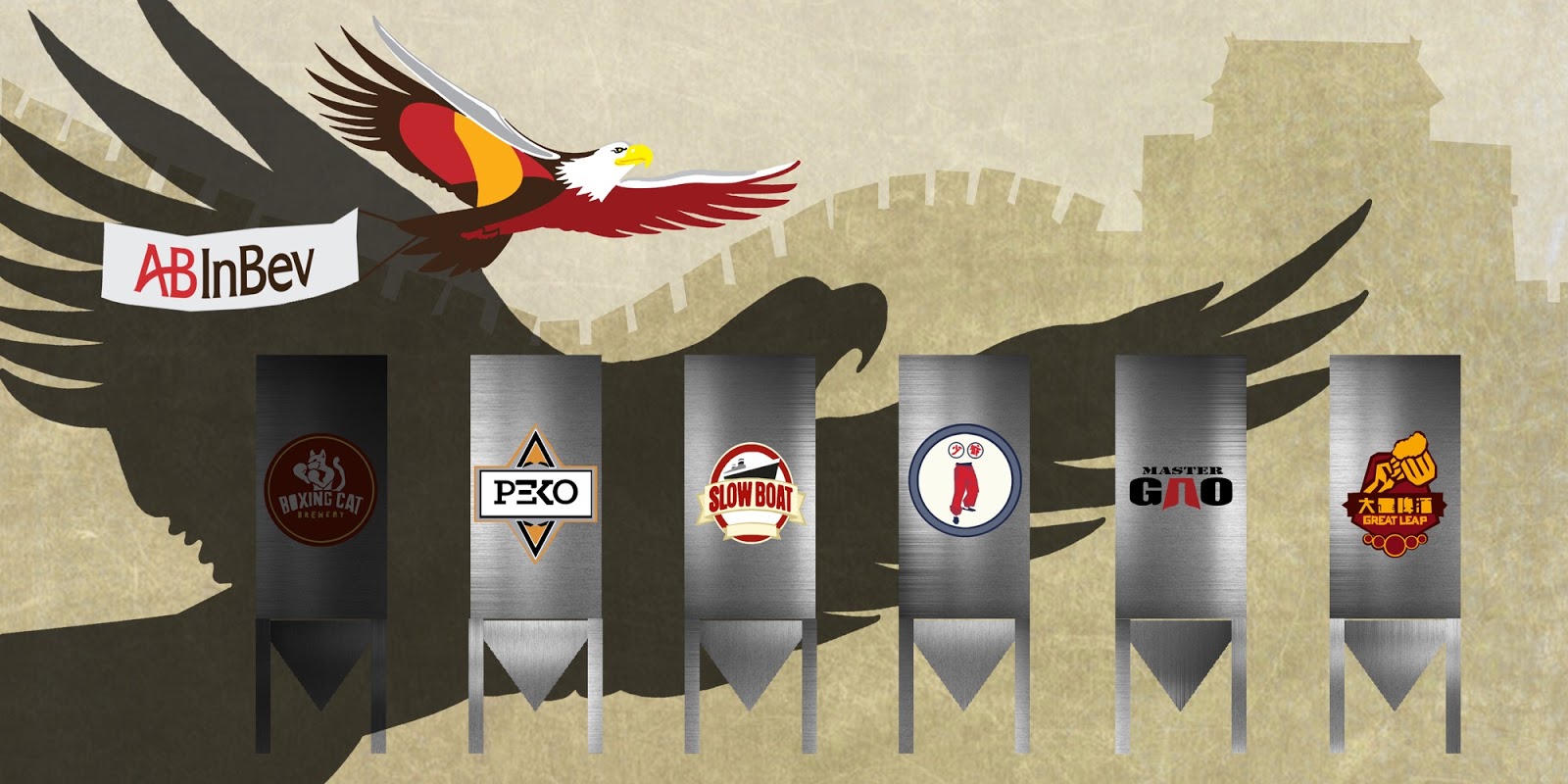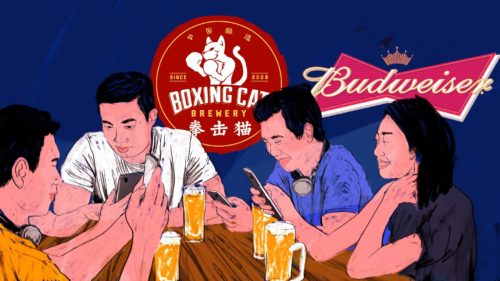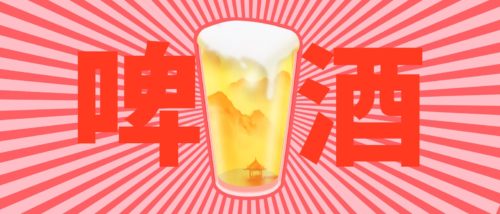Anheuser-Busch InBev and the fight for China craft brewing
AB InBev’s purchase of Shanghai’s Boxing Cat Brewery last March was only one step in the conglomerate’s plan to dominate the China beer market. But it faces resistance led by one very serious local contender.

“If you want to see Great Leap, Slow Boat, and guys here locally continue to thrive, then support us. Do not go to [AB InBev] breweries.” —Chris Lennert, Left Hand Brewing

Near the end of Day 2 of the Beijing Invitational Craft Beer Festival two weeks ago, a three-day drinkathon featuring 39 breweries from 14 countries, the venue smelled like spilled beer — double imperial IPAs, vanilla cream ales, dark apricot goses, nitro coffee porters — and French fries. One attendee sang a slurred “Happy Birthday” over the PA system, friends turned against friends to lunge at mini-cakes, while others lurched and stumbled, incredulous that three hours had already passed. In other words, it was a good evening.
But earlier that day, the mood had not been so convivial. The host of the festival, Carl Setzer, had convened a panel to discuss the effect of Anheuser-Busch InBev’s encroachment into the Chinese craft beer scene. On the verge of tears, Setzer announced that his company, Great Leap Brewing — founded in a tucked-away Beijing courtyard in 2010, the first craft brewery in the city and now one of the largest in China — planned to break ground on a 500,000-hectoliter production facility in April. Before he invited the audience to ask questions, he said, “I do know there are people here who represent ZX and they were going to ask me about it anyway.” He leaned into the microphone. “And fuck you for trying to take my moment.”
The “ZX” in question, the group that drew the room-silencing expletive from Setzer, is ZX Ventures, the new innovation division of Anheuser-Busch InBev, or ABI — a multinational conglomerate that owns more than 400 brands, including Budweiser, Corona, and Hoegaarden, and is known as the “Walmart of beer” for its aggressive expansionary business practices. It made headlines last year with the acquisition of Boxing Cat Brewery in Shanghai, which was founded in 2008 and is considered China’s longest-lasting craft brewery.
Setzer despises AB InBev. He says it’s trying to destroy his livelihood.
“ABI isn’t dumb. It buys well-situated, geographically relevant brands just to disrupt these markets,” Setzer said. “It finds areas where it can retard the growth of independent groups, just to be annoying.”
Casual beer drinkers might not taste the difference between a truly independent craft beer and an AB InBev brew, but Setzer fears ABI’s behavior could damage the Chinese craft industry as a whole. He said it’s risky to publicly criticize such a powerful food company, but he wants more transparency. “The absence of the conversation is what angers me the most,” he said.
And that’s why Setzer organized the March 24 panel discussion in Beijing, featuring craft beer big shots from around the world — the likes of Mikkel Borg Bjergsø of Denmark’s Mikkeller Brewing, John Mallett of Bell’s Brewery in Michigan, and Chris Lennert of Colorado’s Left Hand Brewing.
Setzer’s main contention is that ABI misrepresents its beer as “craft,” which obscures the huge infrastructure that allows it to produce at unmatchably low prices. He singled out ABI-acquired brand Kaiba, originally a Shanghai mainstay. It should hardly count as “craft” due to its production methods, he said, “but on the branding of the bottle, it couldn’t say ‘craft beer’ more times if it tried. It uses ‘craft beer’ on its packaging in a way that, if you’re a craft brewer, it makes you sick to your stomach.”
“[ABI] really knows what it’s doing,” said Kate Brankin, marketing director at Chicago’s independent Pipeworks Brewing Company and a panelist at the Beijing discussion. “It knows that it’s trying to paint the image that it’s a craft company. It’s not doing it by accident.”
In the U.S., this is a critique that has long been levied against ABI. “If it’s proud about what it does — and I believe that it is — why doesn’t it put on every single label, ‘Brewed by ABI’?” said Lennert of Left Hand, a 100-percent employee-owned company. “It’s in its very DNA to disrupt, to confuse.”
To Setzer, this is particularly insidious; he thinks AB InBev’s strategy is to start price wars that put independent brewers out of business.
“I think Budweiser basically does the same thing in China that it does around the world, which is continual acquisition and continual monopoly,” said Cui Yongri 崔永日, founder and brewmaster of Devolution Brewing in northeast China’s Dalian. “As for whether it’s good or bad, it depends on your perspective. I personally don’t like its methods. The way it’s going about it will inhibit the development of brewer diversity, localization, and personalization.”

Anheuser-Busch InBev is owned by Belgian-Brazilian conglomerate 3G, which also owns Kraft-Heinz, Burger King, and Tim Hortons. ABI’s craft beer rollout follows a familiar 3G pattern: Buy popular brands, cut costs, expand overseas. Repeat. (The company did not respond to requests to comment for this story.)
AB InBev was late to the American craft beer party — between 2010 and 2016, the value of Budweiser sales fell 17 percent while craft beer sales grew at a double-digit pace — and it has, in a way, been playing catch-up ever since. The company gained a reputation for undercutting independent craft breweries — elbowing them out of bars in their local market, for instance, by offering those establishments a range of discounted ABI products — with the goal, analysts say, of pushing consumers back to its core products. “Do you think they care about making the Breckenridge Vanilla Nitro Porter?” Lennert said. “Do you think that’s where their money is? No, they want to make Bud Light.”
ABI has bought 10 American craft breweries in the last seven years, starting with the 2011 acquisition of Chicago’s Goose Island. Many of those brands were in debt when ABI took over, and by the time it acquired North Carolina’s Wicked Weed in 2017, the conglomerate had become known as a vulture preying on an independent industry. Distributors boycotted. The r/beer forum lit up with craft purists’ disappointed comments. Craft brewers are still angry about ABI’s 2015 Super Bowl ad, which mocked “fussy” craft flavors like “pumpkin peach ale”; ABI neglected to note that just weeks earlier, it had acquired Elysian Brewery, a company known for its pumpkin peach ale.
Now market watchers say ABI is at capacity in America, as it has portfolio craft breweries in almost every geographical region (and bought the rights to name beers after more than a dozen area codes). But the company refuses to be late for the Chinese craft movement. Its market share in China has risen steadily since 2012, with a 7.3 percent increase last year. In addition to Boxing Cat, ABI also owns the Chinese light lager Harbin Beer (once endorsed by Shaquille O’Neal, of all people).
China is the largest beer market in the world by volume, but it’s woeful in terms of profitability, with beer makers earning a profit of only $2 per hectoliter of beer sold, a mere 7 percent of the rate in the U.S. The industry is still dominated by somewhat interchangeable light lagers like Snow, Tsingtao, and Yanjing — not unlike the homogenous U.S. beer market in the 1990s, when craft first took off. The Chinese market declined an estimated 1 percent overall last year at the same time that ABI reported its 7.3 percent growth, which the company attributes to China’s increasing preference for “premium” beers.
While the craft brewing industry is somewhat protected stateside, various factors favor the big guys in China. The country has no group similar to the Brewers Association, which in the U.S. certifies small brands as truly “craft” with an independent craft brewers seal. And in recent years, AB InBev has signed deals for exclusive, full-tap bar takeovers, which would violate antitrust laws in the U.S.
Perhaps most importantly, the Chinese government only allows imported beer brands — or domestic brewers who produce at a very high volume (12,000 bottles per hour) — to sell at other restaurants and bars. That’s why craft brands like Great Leap only sell from their own taprooms; others, like Jing-A Brewing, produce on contract at larger breweries. (There are signs, however, that China realizes this last rule is bad for competition: Setzer said the beer division of the Alcohol Association of China has invited him to participate as regulators draft new rules.)
Wang Rui 王睿, who goes by Geezer, is the founder of Chengdu-based Harvest Brewing Company 丰收精酿啤酒, and he thinks the odds are stacked against Chinese brewers. “Actually, Budweiser is not that scary,” he said. “What’s scary is that by complying with the current system, you become their victim. Appearances aside, you just have to be true to yourself, and there’ll be hope yet for changing society.”
In January, AB InBev opened the doors to its new plant in Wuhan, billed as a craft brewery that will produce Goose Island, Boxing Cat, and Kaiba beers. Some question its authenticity: The building is located on Budweiser factory grounds. Meanwhile, Boxing Cat has begun to distribute on a national level with focused marketing in second- and third-tier cities.
As for ABI’s strategy and the advantages that big companies have, some say it’s just part of the business. “Is it unfair? I guess, but [ABI] developed it. It paid for it,” said Michael Jordan, the brewmaster for Boxing Cat. “It’s no different than someone brand new starting out and comparing themselves to Great Leap.”
Jordan and Great Leap’s Setzer are old friends and remain so, but in a passionate blog post last year after Boxing Cat was acquired, Setzer wrote:
Boxing Cat as of whenever they signed their contract agreements stopped being the Boxing Cat that it was for the last eight years. That’s a watershed event. By the American Brewers Association and a handful of other trade groups around the world, including the Craft Beer Association of China, as soon as you sell to ABI, or any other commercial brewing concern, you stop being craft.
Boxing Cat still brands itself as a craft brewery. “Craft beer as a definition to me has always been a bit of a joke,” Jordan said. “I started in this industry in America in 1995, a time craft beer didn’t exist. I worked at a microbrewery. Craft beer was just kind of a tag that people associated or put onto beer that was of historical style, pushing in new directions to make good flavored beer.”
However beers are defined, ABI’s success in China has underscored the fact that there are investments to be made in the premium beer space, and that has given rise to another concern among beer lovers: that quality will get the short shrift as brewers start businesses with acquisition — whether by ABI or other “strategic partners” — as their end goal.
“I feel certain people have opened breweries in China to get bought out,” Jordan said. “Many people go the [private equity] route, which is also interesting because they are not brewers and only have an interest in making money off their investment in a relative short amount of time.”
Meanwhile, independent Chinese brewers lie in wait.
“What’s best for Chinese craft beer development is for local, independent Chinese craft breweries to work together for the next five to 10 years, whether we like each other or not, and agree that ABI is not good for our industry,” Setzer said. “Its presence here is not something we can stop, but we can at least have a conversation about why it’s against all of our interests for one or two of us to give it support or recognition or validation in the China market.”
Lennert said the best bet for independent Chinese craft is to invest in educating consumers. To any beer drinkers out there, he said, “If you want to see Great Leap, Slow Boat, and guys here locally continue to thrive, then support us. Do not go to [AB InBev] breweries.”
“I think craft beer’s appeal is its diversity and individuality,” said Cui of Devolution Brewing. “If there were just a few big breweries, the industry would have no meaning.”






